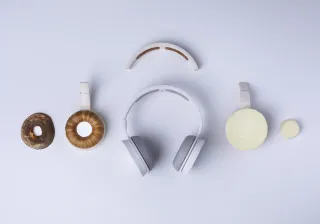VTT has developed a thermally formable, biodegradable material, which is 100% bio-based. Its suitability for applications such as furniture makes it an attractive alternative to wood and biocomposite materials available in the market, not only because of its biodegradability but also due to its formability and colouring properties.
Biocomposites made from entirely bio-based raw materials can be used to replace fossil raw material derived plastics, which have traditionally been used in industrial applications. Being thermoformable, the material is well suited for various manufacturing processes and products.
"All the goals we set were achieved: the material is 100% bio-based, cellulose fibres account for a significant proportion, it looks good and it has excellent performance characteristics", says Lisa Wikström, Research Team Leader from VTT.
At the end of their life-cycle, products made from this material can either be re-used, composted, or burned to generate energy without any fossil-based carbon dioxide emissions. Because the material degrades into carbon dioxide and water due to microbial actions, it will not exacerbate the global microplastic problem.
"New bio-based, thermally formable materials and composites are a promising alternative for the plastic products market. However, a big breakthrough is yet to come. A major shift requires cooperation between material and process developers as well as designers," Wikström concludes.
The first model product is a designer chair manufactured as a joint effort between VTT, Plastec Finland and KO-HO Industrial design. The chair, manufactured using traditional compounding and injection moulding technologies, is made from wood-based cellulose fibres, renewable and industrially compostable, thermoformable polylactide, and bio-based additives.
VTT developed the material in the ACEL research programme funded by Clic Innovations Ltd., and the proof of concept stage was carried out with Plastec Finland, an injection moulding company.





